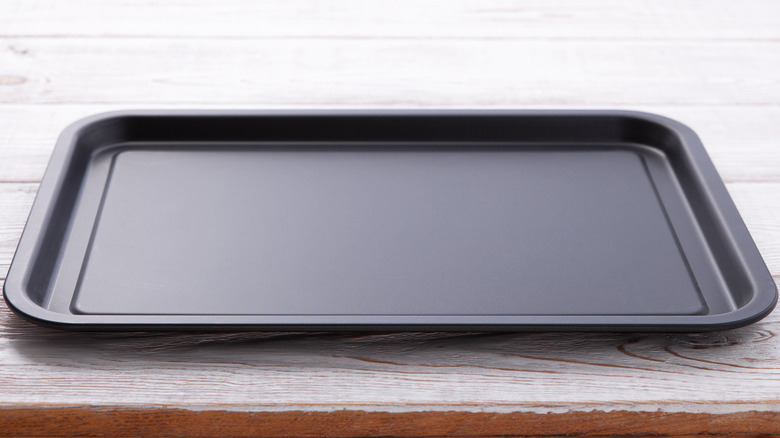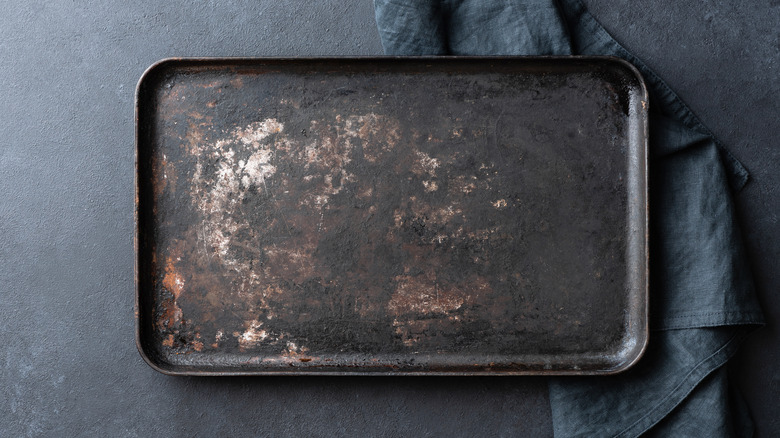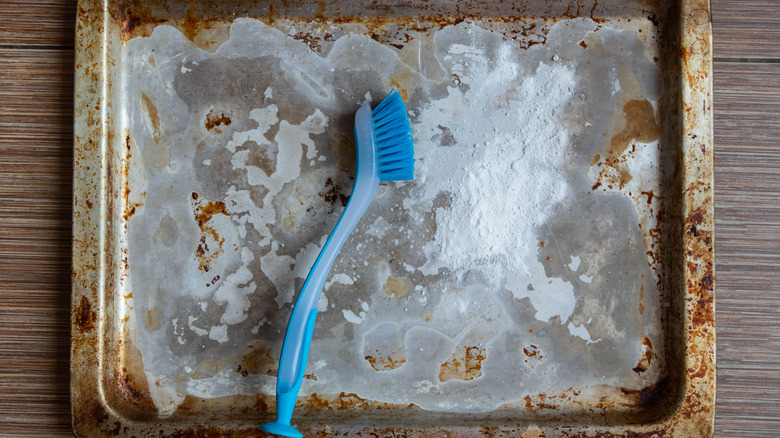The Secret To Spotless Baking Sheets Is Hiding In Your Pantry
It's probably sitting there behind the cinnamon and oregano in your spice cabinet. That squat container of cream of tartar that can be important to baking is a mystery to many. You dig it out when a recipe calls for it. But cream of tartar, an acid derived from the byproducts of wine making, can be used in myriad ways other than creating fluffy meringues and high-rising cakes. It can also remove those pesky stains off your baking sheets.
If you've owned baking sheets for any length of time, you've probably noticed sticky brown or black stains building up on the baking surface. That versatile cookware gets used for everything from baking cookies and breads to roasting meats and vegetables — even making entire sheet pan dinners. That dark patina is the result of burned oils. Oils have different smoke points, and because olive oil is so often used for roasting on baking sheets at high temperatures, it's one of the main culprits. Nonstick baking sheets can also acquire stains from dark-hued foods like beets or tomatoes. But don't make one of the common baking sheet mistakes by putting it in the dishwasher.
Cream of tartar to the rescue
Fear not, those stains aren't harmful and don't compromise a sheet pan's performance. It's a seasoning actually, similar to that coveted patina on your grandma's well-worn cast iron skillet. In fact, the experts at America's Test Kitchen found that black and brown surface is not just an homage to a pan's history, it can improve its efficiency because darker colors are better at absorbing heat than lighter ones. Also, that pan seasoning allows for baked foods to release more easily and aids in protecting the pan's surface from corrosion caused by acidic foods. So you may not want to bring that pan back to its original pristine state of glisten.
However, if you do want to restore your baking sheets to spotlessness, cream of tartar can do the trick. Simply make a paste of the white powder with a little water and spread it over the sheet's surface. Let it sit for at least 30 minutes, after which you can scrub it with a non-abrasive sponge. This method is not recommended for nonstick surfaces due to cream of tartar's abrasiveness.
Cream of tartar can also be used for other kitchen cleaning applications. Scratched plate? Rub it with a wet scouring pad and a little cream of tartar, rinse, and wipe clean with a microfiber cloth. Dull stainless-steel appliances? Make a paste of cream of tartar and water, then use a microfiber cloth to polish the surface in a circular motion, and finish it off with a fresh cloth.
Other tips for spotless baking sheets
Other common kitchen ingredients lurking in your cupboard may also be useful in spiffing up those dirty sheet pans. Soak your pans in boiling water with a sprinkle of baking soda until the liquid stops bubbling. Then let it sit for about an hour before wiping it away and hand washing as you normally would. Or give your sheet pan a bath in a 1-1 solution of baking soda and vinegar for 30 minutes or up to an hour. Then scrub clean.
For nonstick pans, a no-scrub method can preserve the coating while removing the baked-on mess. Add 1 tablespoon baking soda to a few drops of dish soap and some hot water. Let it soak for at least an hour or even overnight. The combination of baking soda's mild abrasiveness with the grease-cutting properties of dish detergent can make your pan sparkle again.
It's important to check your cookware's care and cleaning instructions, located on most manufacturers' websites. Stainless steel and aluminum manufacturers often discourage using scouring pads, abrasive powders, or harsh chemicals. All-Clad, for example, cautions not to use steel wool or other scouring pads or "detergents containing bleach or peroxide." For burned grease or food residue that can't be removed with regular dish detergent, they recommend boiling a 50-50 mixture of white vinegar and water in the pan to soften the stuck-on grease, or scrubbing it with a nonabrasive sponge and non-chlorine cleanser like Bar Keeper's Friend or Bon Ami.


